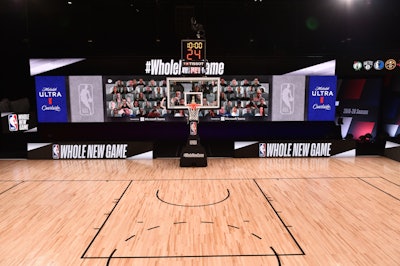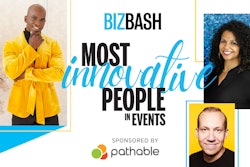
The Basics: In March 2020, because of the COVID-19 pandemic, the NBA suspended its regular-season games. Like the rest of the event industry, the shutdown posed a huge loss for attendees as well as the bottom line. So in order to recoup some revenue and give fans a winning end to the season, the league implemented its NBA Restart plan at the ESPN Wide World of Sports Complex, which was dubbed the “bubble.” This is where 22 teams were invited to complete the season and compete for the championship. But since spectators still weren’t allowed inside the “bubble,” the NBA created a virtual fan experience known as Michelob ULTRA Courtside, where more than 300 fans appeared live on 17-foot video boards surrounding the court during each game. Community groups, basketball legends, players’ families, and notable participants including Barack Obama all made a virtual appearance.
 A virtual fan experience, known as Michelob ULTRA Courtside, featured more than 300 fans on 17-foot video boards surrounding the court during each game. Community groups, basketball legends, players’ families, and notable participants including Barack Obama all made a virtual appearance.Photo: Courtesy of NBA
A virtual fan experience, known as Michelob ULTRA Courtside, featured more than 300 fans on 17-foot video boards surrounding the court during each game. Community groups, basketball legends, players’ families, and notable participants including Barack Obama all made a virtual appearance.Photo: Courtesy of NBA
 "Fans are the core of the NBA experience, and the pandemic forced us to reimagine how we engage with them in a meaningful way," said Kelly Flatow, the NBA’s executive vice president of events.Photo: Courtesy of NBA
"Fans are the core of the NBA experience, and the pandemic forced us to reimagine how we engage with them in a meaningful way," said Kelly Flatow, the NBA’s executive vice president of events.Photo: Courtesy of NBA
Most Innovative Use of a Venue: As part of its commitment to social justice and civic engagement, the league’s team governors (in every city where the league franchise owns and controls the arena property) worked with local election officials to convert the sports facility into a voting location for the 2020 presidential election. In total, 23 teams used their arenas or practice facilities for voting-related activities, and all 30 teams were involved in other civic activities, including voter registration events, poll worker recruitment and training, and campaigns to raise awareness around census completion.
“The change in the 2019-20 season provided a unique opportunity for teams and venues, as most elections fall during a typical NBA season,” Flatow explained. “All NBA teams were committed to being a trusted partner in their communities and figuring out how they could be most impactful around census issues, voter registration, poll worker recruitment, or providing facilities to vote safely.”
What’s Next: In late December, the NBA started a shortened, 72-game season outside the “bubble.” Instead, teams are playing games at their home arenas. (The Houston Rockets' season opener against the Oklahoma City Thunder was postponed because three players tested positive for COVID-19.)
"We’ve learned a lot since we suspended our season in March and operated our campus at Disney World to put in place the appropriate protocols—social distancing, mask-wearing, hand washing—to mitigate the risks associated with COVID-19 transmission," Flatow said. "There remains enormous uncertainty surrounding the virus, especially as we see a rise in cases here in the U.S., and we are very mindful of that as we try to operate over the coming weeks and months."
She continued, “We are also working closely with the teams, the Players Association, and league health and medical experts on developing protocols to keep players, coaches, referees, and staff safe and for when we can have fans back in our arenas, which will vary based on each team market. These protocols include how fans would enter and exit our arenas, contactless concessions, physical distancing, and cleaning policies."



















